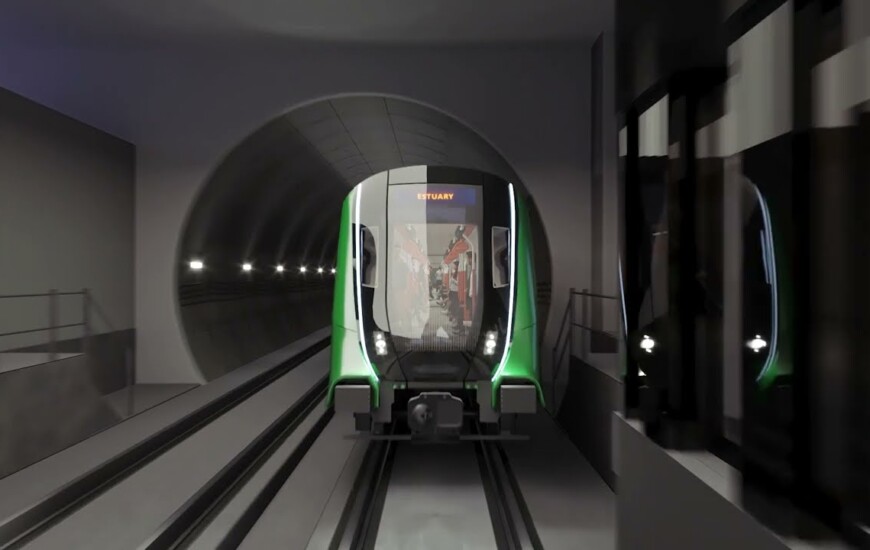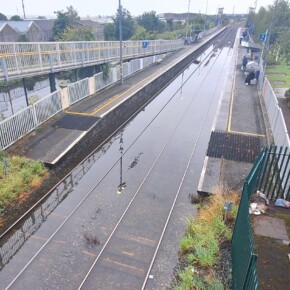Metrolink costs likely to rise
Mike Finnerty 21 May 2025
The never-ending Metrolink soap opera has taken another turn, with latest rumblings that the project could end up at least 20% over budget.
The rail service, which was first proposed all the way back in 2001, has been threatening to pick up steam over the last 18 months with the government looking to make the project the next big capital spending project.
In June 2024, the Metrolink project hired New Zealander Sean Sweeney as project manager.
Sweeney delivered the City Link Project in Auckland, the largest infrastructure project in the nations history and has now been tasked with navigating the labyrinth of Ireland’s planning system.
In comparison to the Metrolink saga, the City Link Project commenced in 2016 and saw its first test trains take to the rails earlier this year ahead of a planned 2026 opening.
In an interview with the Business Post, Sweeney said that in all likelihood the Metrolink will go over budget, and by as much as 40% depending on external circumstances.
When costed and budgeted by the government in 2021, the Metrolink had a price tag of €9.5 billion, a figure that Sweeney now estimates would come in on the “conservative” side.
In the interview, Sweeney noted “there has been research on major rail projects, and as a global category, they on average come in about 40% over cost, and this is across lots of projects.”
He said there are a number of factors at play when it comes to costing a major infrastructure project like the Metrolink, and said “we are going to encounter things we didn’t realise existed.”
Persistently high inflation rates and the cost of living crisis has seen 20% added to the price tag since 2021, he said.
It has been anticipated that the project will be operational in some capacity by 2035, but even that timeline is under scrutiny by Sweeney.
He noted “any date I give, until we sign up our major contractors, they are all estimates.”
He explained “the people that set the cost and the timeframe are your builders, and they might look at our dates and say, “no way,” or they might say ‘we can take a year out of that’”.
Sweeney was brought on board the Metrolink project in a bid to give the government some form of an infrastructure-based win and create a major capital spending project at a time of major global economic uncertainty, but he said that Ireland’s notoriously Kafka-esque planning system could put a spanner in the works.
‘I noticed as soon as I got here, things take longer; I don’t have a magic wand to sort that out.’
He further went on to explain that other European countries are looking to build Metrolink-style projects, and Ireland is at the back of the proverbial queue.
The Kiwi implied that Ireland is not an attractive market for foreign capital to invest in and that foreign investors believe their money would be better spent in other European nations that have a track record of delivering a return on investment.
‘There are €160 billion worth of metro projects currently being carried out around the world, so that market is already crowded, and Ireland is not seen as attractive to bidders,’ he explained.
He warned that the project would be “dead in the water” without support from the international construction market.
Sweeney did offer a ray of hope, however; he said that projects such as the Metrolink “leave the country better off” when they are eventually built.
Indeed, economists note that in terms of economic uncertainty, major capital projects such as the Metrolink stimulate the economy, providing steady employment and delivering a significant return on investment once built.
Last year, Fine Gael MEP Regina Doherty noted that the European Investment Bank sunk €500 million into the project prior to the 2008 economic crash and that the same well could be tapped again.
“At present, Dublin is one of the very few EU capitals without a rail link to the airport, the project has already taken too long to get to this stage, and there is a significant financial commitment involved from the taxpayer.”
“In 2023, the EIB signed a total of €75.14 billion of financing for European projects. Europe has an important role to play,” she said.
Local Labour councillor James Humphreys expressed frustration with the mixed messages about the project.
“One Minister For Transport says it’s full steam ahead. The other says we don’t know if it’s happening. That’s not joined-up government —it’s drift, and Swords is being left behind.”
He says the issue goes beyond politics and planning, and now threatens local credibility.
“MetroLink was meant to be the centrepiece of transport-led planning. Yet here we are, in the same month the Government signed off on a new National Planning Framework, and they still can’t commit to starting the one project it’s built around,” the Swords councillor said.
Humphreys says that the population of Swords is on track to exceed 100,000 people by 2035, the current estimated delivery date of the Metrolink.
He says it is crucial that the Metrolink is built on time to accommodate the growing population in Swords, which is now one of Ireland’s fastest-growing towns.
“Communities like Swords have done their part—we’ve zoned land, built housing, and improved local links. It’s the Government that’s fallen behind. People deserve delivery, not more headlines,” he said.
In late March, Minister for Transport Darragh O’Brien said that the Metrolink would be built “regardless” of the global economic climate.
Speaking to the Irish Examiner in March, the local Fianna Fáil Minister said that it is anticipated that the railway order for the project will be given the green light by An Bord Pleanála in October, with the government putting the project out to tender after that.
However, the usage of the term “tender process” within the Irish railway system doesn’t inspire confidence.
Catering services were suspended on Dublin-bound trains at the start of the Covid-19 pandemic and five years later, full catering services are yet to return as the catering process on Irish Rail is, you guessed it, is “out to tender,” and the process is yet to be completed.
A bag of crisps and water is a slightly different proposition to a billion-euro infrastructure project, but the principle is the same; Metrolink’s greatest enemy isn’t economics, it’s the glacial pace of Ireland’s planning system.











